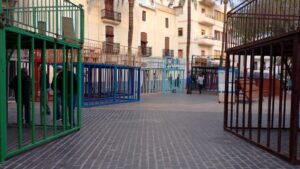THREE NEW INFECTIONS IN XÀBIA AS VIRUS INCREASES IN MARINA ALTA
New infections double across the Marina Alta region as the Regional Government looks to act swiftly to halt the acceleration of the virus across the Comunidad Valenciana.
Xàbia has recorded three new COVID-19 infections by PCR test this week, taking the total number to 165 since the health crisis began in March. The accumulated infection rate over the past 14 days has risen to 36.23 per 100,000, a jump of 25% on the last update (Oct 19), the consequence of 10 new positive tests over the past two weeks. There have been no new deaths, the total number remaining at three.
Across the Marina Alta region, which is administered by the health authority based in Dénia, there have been 28 new infections, almost double the number of the previous available data (Oct 19), according to data provided by the Valencian health authority, bringing the accumulated total to 1.430 since the health crisis began.
They are:
- Dénia – 11
- Ondara – 3
- Xàbia – 3
- Calp – 2
- Orba – 2
- Teulada – 2
- Xaló – 2
- Alcalalí – 1
- El Vergel – 1
- Pedreguer – 1
Comunidad Valenciana: The number of active cases of COVID-19 in the Valencian region has surpassed 7,000 for the first time since the crisis began, now standing at 7,109. Hospital admissions have risen by over 90% since the beginning of the month and intensive care wards seen their COVID-19 admissions double during October. The 14-day cumulative rate has risen to 142.15 per 100,000 people, still only bettered by the Canary Islands, but a rise of 33% over the past week must be of concern to the regional government.
On Thursday evening, the president of the Generalitat Valenciana Ximo Puig announced that the region would be adopting a night curfew as soon as possible to deal with a surge in infections, forcing people off the streets between 12 midnight and 6.00am to deal with social gatherings, such as the botellón, and parties in private houses which have been the sources of recent outbreaks.
Spain passes the 1 million mark
This week Spain became the first country in Western Europe to record 1 million COVID-19 cases. Across the country, the virus is now spreading at an accelerated pace in all regions, with the exception of the Canary Islands and Madrid. The region of Navarra, which has now closed its borders for 15 days, has passed the 1,000 mark for the 14-day cumulative rate per 100,000 people, reporting a record 1,058 news cases in the period.
Fernando Simón, the director of the Health Ministry’s Coordination Center for Health Alerts (CCAES), said: “On a global level, the situation in Spain is worsening. We have great diagnostic capabilities but the incidence rate continues to rise. The evolution is not as acute as in other European countries but, of course, it is not good.”
When Spain emerged from a three-month lockdown on June 21st, the national 14-day cumulative rate for new infections was 8.08; it is now almost 350. Four months on and only the Canary Islands has a rate lower than 100. Pressure on the health care system is rising and it is clear that the country is facing a very difficult winter.
Government considers a national night-time curfew
Earlier this week Health Minister Salvador Illa confirmed that central government has been considering the introduction of a night-time curfew across the whole of Spain in a further attempt to half the spread of the COVID-19 disease across the nation.
The proposal would impose a curfew from midnight to 6.00am which would allow bars and restaurants to remain open until the restriction begins after which outdoor drinking – the notorious ‘botellón’ – and parties in private residences would be prohibited.
Illa also confirmed that a nationwide curfew would not be implemented unless all Spain’s regional governments were in agreement (it is supported in principle by the Generalitat Valenciana). However, there is a complication since it is believed that a new State of Alarm would be required to give the curfew a legal framework to limit fundamental rights and some opposition parties, whilst supporting the idea of a curfew, oppose the declaration of a new State of Alarm.
On Thursday, the Ministry of Health admitted that it was also considering forcing all non-essential businesses, including bars and restaurants, to close at 10.00pm in almost all its autonomous regions with the exception of the Balearic Islands, the Comunidad Valenciana, the Canary Islands, Cantabria, Extremadura and Galicia.
More than 7 million people placed in perimeter confinement
By the end of this week, more than 7.2 million people will find themselves in perimeter confinement, unable to leave or enter their municipality or region without just cause.
Both autonomous regions of La Rioja and Navarra have closed off their entire territories for at least two weeks whilst the Aragonese provincial capitals of Zaragoza, Huesca and Teruel are also closing their perimeters for at least 30 days. In addition, more than 50 municipalities ranging from the capital Madrid to the small town of Jerte in Extremadura have also seen the implementation of more restrictive measures to combat the pace of the infection.
However, health experts have already warned that perimeter confinement would not be enough to prevent the disease’s march through the population and that the main objective should concentrate on limiting interaction between people which would mean restrictions on movement, reduction of opening hours, limiting capacities and closing inside spaces.
Daniel López Acuña, former director of emergencies of the World Health Organization (WHO) said that: “To prevent contagions from growing, a perimeter confinement that seals an area is not enough; for it to be effective, sufficient measures must be taken to restrict activity within“, suggesting that some communities would need to be placed back into Phase 1 of the country’s de-escalation plan. Alberto Infante, professor at the National School of Health at the Carlos III Health Centre confirmed that whilst perimeter confinements halt the transmission of the infection to other areas, it doesn’t stop the disease spreading within the confined area and the only way to do that would be to put measures in place that reduce social interaction.
And that’s a problem for Spaniards. “We are less responsible, we like partying, meeting with family,” admitted banker Carolina Delgado. “We haven’t realised the only way … is social distancing, simple things like not gathering with many people, wearing masks even if you meet friends.“
SOURCES:
COVID-19 C.Valenciana: Monitorage de la Situació
Ministero de Sanidad: Actualización nº 231 (19/10/2020)
ECDC COVID-19 Situation Update
El Pais
Reuters España



